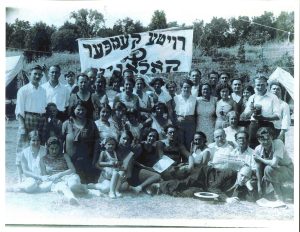Seventy years ago last month, the Nazis began their second deportation of the Jews from the Warsaw Ghetto.
In response, on Jan. 18, 1943, the first organized and armed Jewish/Zionist resistance action in the ghetto was launched. The fighters of the ZZW and ZOB drove the Nazis from the ghetto.
Months later, on April 19, 1943, on the eve of Passover, the Nazi SS and police units entered the ghetto and were attacked by organized Jewish partisans yet again.
There were two separate armed resistance organizations in the ghetto – the ZZW and ZOB. The most famous Jewish leader of armed resistance is Mordechai Anielewicz, commander of the ZOB (Jewish Fighting Organization) during the uprising. The ZOB was an alliance of several Zionist and non-Zionist youth groups. Anielewicz received paramilitary training in Betar as a young teenager and left the group before the war. The ZOB had a socialist orientation, and Betar as an organization did not participate in it, in part because of politics.
ZZW, the Jewish Military Organization, was commanded and manned by Betar members and their allies. Betar’s fighters in the Warsaw Ghetto Uprising have been largely written out of history. Moshe Arens, a former Israeli defence minister who was a Betar member, recently wrote a yet-to-be published book on Betar’s heroic battle against the SS in the ghetto. That book, Flags Over the Warsaw Ghetto (Gefen Publishing, November 2011), and articles by Arens about the ZZW that were published in Yad Vashem Studies, Ha’aretz and the Jerusalem Post have helped to create a far more accurate account of the ZZW’s participation in the uprising. The book and the articles also did much to recall the heroism of Pawel Frenkel, ZZW’s commander.
The ZZW is now thought by historians to have been the better-equipped force in the ghetto, as it had procured machine guns. The ZOB, however, had more fighters.
The groups finally decided to co-ordinate their efforts in the last moments before the April 19 battle began. For 28 days, Jewish warriors fought the enemy and showed bravery not seen since the days of Bar Kochba’s uprising against Rome.
In the Vilna Ghetto, Betar leader Joseph Glazman was deputy commander of the United Partisan Organization, the only armed Jewish resistance group in that ghetto.
Betar was founded in 1923 by Ze’ev Jabotinsky (1880-1940), a figure who is too often forgotten today. Professor Daniel J. Elazar (1934-1999), a scholar of the Jewish political tradition, in the May 15, 1981, edition of the journal Sh’ma Elazar remarked about Jabotinsky’s legacy:
“Would there be serious public commemoration of the 100th birthday of Zev Jabotinsky had it not been for the fact that the Likud won the election in Israel in 1977? Not likely. For 30 years and more, Jabotinsky was one of those non-persons in Israel and the Jewish world… The ruling Labor party made him a non-person for the same reasons that it portrayed [then-prime minister] Menachem Begin and his supporters as uncivilized fascists – it is easier to beat the opposition by painting it as irrelevant, intolerable and non-existent, until it is too strong to be dismissed.”
This year’s 70th anniversary of the Warsaw Ghetto Uprising offers an opportunity to remind today’s Jews about Jabotinsky’s vital contributions.
Moshe Phillips is the president of the Philadelphia chapter of Americans For a Safe Israel.






